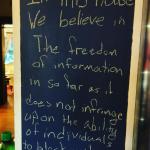I’m over at Stand Firm today.
It is the very early dawn and a firecracker has just popped off near my window, reminding me that, though it is the usual Sunday, it is also Independence Day. This must be a terrible irony, organized by God to make us all feel uncomfortable. After all, independence isn’t something that pairs very well with the Christian life. The trouble is that the creatures whom God has made (us) desire their independence more than anything else they could possibly long for, thinking it will make them free and happy. Whereas God, who knows whereof we are made, that we are but dust, offers the only true freedom, which, perversely, is radical dependence—not on ourselves, nor even on each other, and certainly not on the government, but on him. And yet we don’t believe him. He must be wrong. And so the long days wear on, whether they are Sundays or not.
I can’t imagine that the lectionary organizers thought about this as they went about their work. They want to match the texts to the church year; it doesn’t matter if a secular holiday comes along and tries to muscle in. Still, it’s possible they also are trolling us all. There stands Ezekiel, bowing under the heavy and terrible judgment of God upon his people. Those people certainly knew so much about how to be happy and free. They lived into their own economic and political and spiritual dreams as fully as they could, only to find that God was able to move all the kingdoms of the earth to bring them down low, to the very dust, to send them to that great and terribly wicked place, Babylon. ‘How could you do this to us,’ they cried upon finding themselves in bondage, and so God afflicted Ezekiel with many terrible visions to explain it to them. But these words, from this morning’s lesson, stand out amongst them all:
The descendants also are impudent and stubborn: I send you to them, and you shall say to them, ‘Thus says the Lord God.’ And whether they hear or refuse to hear (for they are a rebellious house) they will know that a prophet has been among them. And you, son of man, be not afraid of them, nor be afraid of their words, though briers and thorns are with you and you sit on scorpions. Be not afraid of their words, nor be dismayed at their looks, for they are a rebellious house. And you shall speak my words to them, whether they hear or refuse to hear, for they are a rebellious house.
Commanding Ezekiel not to be afraid seems a great unkindness, as he is already bowed down so low he isn’t able to stand at all, and the Spirit of the Lord has to come and put him on his feet. He can’t possibly do what he’s being told to do. God will actually have to come and do it for him. But more than that, the people to whom he is being sent are “impudent and stubborn,” which, I think, is a Biblical way of saying “stunning and brave.” These people whom God made and called to be his own are so stubborn that they refuse to hear him. That is, when the words of God are spoken to them, as soon as the sound–and the meaning of the sound–is apprehended, they will immediately reject it. They will, as indeed they already have, know better.
Therefore, the Lord calls them a “rebellious house,” a community of people who are so committed to their own version of events that nothing that anyone can say will sway them, or shift them, or change their minds about anything.
The reader climbs quietly down from the lectern after saying, “The Word of the Lord,” and all the people responding, “Thanks be to God,” and the Psalm begins—either by singing or by saying—which we will come back to, and then the second lesson begins which is about Paul being caught up to heaven. Then the gospel reading is announced, and Jesus climbs off the page and shakes his head at all the people he knew—he knew them—in Nazareth pretending not to know anything about him. “And they took offense at him,” says Mark, rather dryly. Though they had seen his works and heard his teaching, they couldn’t imagine that he had anything to say to them that mattered at all. And Jesus, explaining it to them so that they won’t be confused or anything, says, “a prophet is not without honor, except in his home town,” which is another way of saying, “He came unto his own, and his own did not receive him.”
I mean, I get it, you think you know someone, you see him grow up, you know he comes from a bad family, the family that is still there and isn’t any better or more interesting than you are. How could you possibly fling away your spiritual life on someone who happened to get some weird idea in his head that he was the Son of God? That’s convenient, since he is no one’s son that you know, except his mother, obviously.
In the internet age, Jesus would have faired no better…read the rest here!
Photo by Japheth Mast on Unsplash













